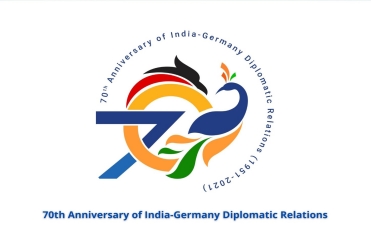- Home
- About Us
-
Consular Services
- Launch of e-Clearance for Afterlife Remains (eCARe) portal
- Instructions regarding entry into the consular Wing
- Reissue of International Driving Permit (IDP)
- General Contact details
- Postal Applications
- Visa Services
- Passport Services
- OCI Information
- Renunciation of Indian Citizenship/Surrender Certificate
- Attestation,Consular and Misc.Services
- Weekly Open House
- MADAD - Consular Services Management System
- Indian Community Welfare Fund
- FAQs on Marital disputes involving NRI/PIO spouses

- Public Notices & Circulars
-
Embassy Wings
- Economic & Commercial Wing
- Contacts
- GI Digital Catalogue

- Overview of Indian Economy
- India-Germany Economic & Commercial Relations
- Doing Business in India
- Make in India

- Invest India

- Flagship Programs of Government of India

- Doing Business in Germany
- Trade Fairs
- Trade Dispute Advisory
- Foreign Investment
- Foreign Trade
- Newsletters

- Attestation of Documents

- Community Welfare
- Culture
- Information Wing/Media Center
- Science & Technology

- Political
- Consular
- Defence Wing
- Economic & Commercial Wing
-
Media Center
- e-books

- India Perspectives

- Documentaries

- Constitution Day 2023
- Calendar of Activities
- Press Releases
- News Articles
- Constitution Day
- Flag Code of India and Prevention Insults National Honour Act, 1971
- INDIA @THE UN SECURITY COUNCIL 2021-2022
- Important statements by policy-makers in India

- Photo Gallery
- Yoga

- e-books
- India-Germany Relations
- MIIM
- Useful Links
- Tenders
Highlights of the Union Budget 2016-17: India further opens up to German Mittelstand
Embassy of India
Berlin
****
Highlights of the Union Budget 2016-17: India further opens up to German Mittelstand
The Union Finance Minister of India Mr. ArunJaitley presented the Union Budget of India to the Parliament on February 29, 2016. Despite the global economy in a serious crisis and a shortfall in India's monsoon for two consecutive years, the Indian economy has been robust and has grown 7.6% in 2015-16. The foreign exchange reserves have reached a highest ever level of about USD 350 billion dollars. The fiscal deficit in 2015-16 and 2016-17 have been retained at 3.9% and 3.5% of GDP respectively. The current account deficit is projected to be 1.4% of GDP in 2016. IMF has hailed India as a 'bright spot' and the World Economic Forum has described India's growth as 'extraordinarily high'.
2. Key highlights of the budget 2016-17 relevant to German companies, particularly the Mittelstand:
- India's agenda for the financial year is to 'Transform India' so that it has a significant impact on the economy and the lives of its people.
- Focus on ensuringmacro-economic stability and prudent fiscal,boosting domestic demand, continuing the pace of economic reforms and policy initiatives.
- Enhance expenditure in priority areas of infrastructure sector, employment generation and recapitalisation of the banks.
- As part of the "Skill India" mission, Government to set up 1500 Multi Skill Training Institutes across the country with a fund of Euro 226 million and skill 10 million youth over the next three years.
- Ensure early passage of the Goods and Service Tax bill and Insolvency and Bankruptcy law.
- To undertake important reforms by freeing the transport sector from constraints and restrictions;enact a comprehensive law to deal with resolution offinancial firms;provide legal framework for dispute resolution and re-negotiations in PPP projects and public utility contracts;undertake important banking sector reformsand undertake significant changes in FDI policy.
Foreign Investment
- Foreign investment will be allowed in the insurance and pension sectors in the automatic route up to 49%.
- 100%FDI in Asset Reconstruction Companies (ARCs) will be permitted through automatic route.
- Foreign Portfolio Investors (FPIs) will be allowed up to 100% of each tranche in securities receipts issued by ARCs subject to sectoral caps.
- Investment limit for foreign entities in Indian stock exchanges will be enhanced from 5 to 15% on par with domestic institutions. The existing 24% limit for investment by FPIs in Central Public Sector Enterprises, other than Banks, listed in stock exchanges, will be increased to 49%.
- FDI will be allowed beyond the 18 specified NBFC activities in the automatic route in other activities which are regulated by financial sector regulators.
- To give impetus to food processing industry, the Government intends to allow 100% FDI through FIPB route in marketing of food products produced and manufactured in India.
- With a view to promote Make in India, foreign investors will be accorded Residency Status subject to certain conditions, unlike currently where the investors are granted business visa only up to 5 years at a time.
- In order to ensure effective implementation ofBilateral Investment Treaties signed by India with other countries, the Government proposes to introduce a Centre-State Investment Agreement and states which opt to sign these Agreements will be seen as more attractive destinations by foreign investors.
- To introduce a bill to amend the Companies Act, 2013 in the current Budget Session of the Parliament, which would also improve the enabling environment for start-ups. All these decisions will facilitate ease of doing business for foreign investors and their domestic recipients.
Infrastructure
- The total outlay for infrastructure is Euro 2212 billion with speeding up of road construction.
- To approve nearly 10,000 kms of National Highways in 2016-17.
- In the civil aviation sector, the Government to draw up an action plan for revival of unserved and underserved airportsat an indicative cost of Euro 7 million to Euro 13 each.
- To modernise ports and increase their efficiency. Sagarmala project has been rolled out. To develop new Greenfield ports in eastern and western coasts of the country. Work on National Waterways is being expedited. Euro 8 billion provided for these initiatives.
Taxation
- In the earlier budget, Government had mooted proposal to reduce Corporate Tax from 30% to 25% over a period of four years, accompanied by rationalization and removal of various tax exemptions and incentives. Final plan of phasing out exemptions proposed in the current budget.
- New manufacturing companies which are incorporated on or after 1.3.2016 are proposed to be given an option to be taxed at 25% + surcharge and cess provided they do not claim profit linked or investment linked deductions and do not avail of investment allowance and accelerated depreciation.
- To lower the corporate income tax rate for the next financial year for small enterprisesi.e companies with turnover not exceeding Euro 0.6 million (in the financial year ending March 2015), to 29% plus surcharge and cess.
- For further promoting start-ups, the Government intends to assist their propagation through 100% deduction of profits for 3 out of 5 years for startups set up during April 2016 to March 2019.
- In line with the Make in India campaign of the Government, the Government proposes to make changes incustoms and excise duty rates on certain inputs to reducecosts and improve competitiveness of domestic industry in sectors like Information technology hardware, capital goods, defence production, textiles, mineral fuels &mineral oils, chemicals & petrochemicals, paper, paperboard & newsprint, Maintenance repair and overhauling [MRO] of aircrafts and ship repair.
- The Government is committed to providing a stable and predictable taxation regime and reduce black money.
- The Government would not retrospectively create a fresh tax liability and will not resort to such amendments in future.
- Non-residents without PAN are currently subjected to a higher rate of TDS and the Government proposes to amend the relevant provision to provide that on furnishing of alternative documents, the higher rate will not apply.
- To implement Indian Customs Single Window Project at major ports and airports starting from beginning of next financial year.
- The customs Baggage Rules for international passengers are being simplified so as to increase the free baggage allowance and filing of baggage declaration will be required only for those passengers who carry dutiable goods.
For more details: http://indiabudget.nic.in/ub2016-17/bh/bh1.pdf
http://indiabudget.nic.in/ub2016-17/bs/bs.pdf
*****

























